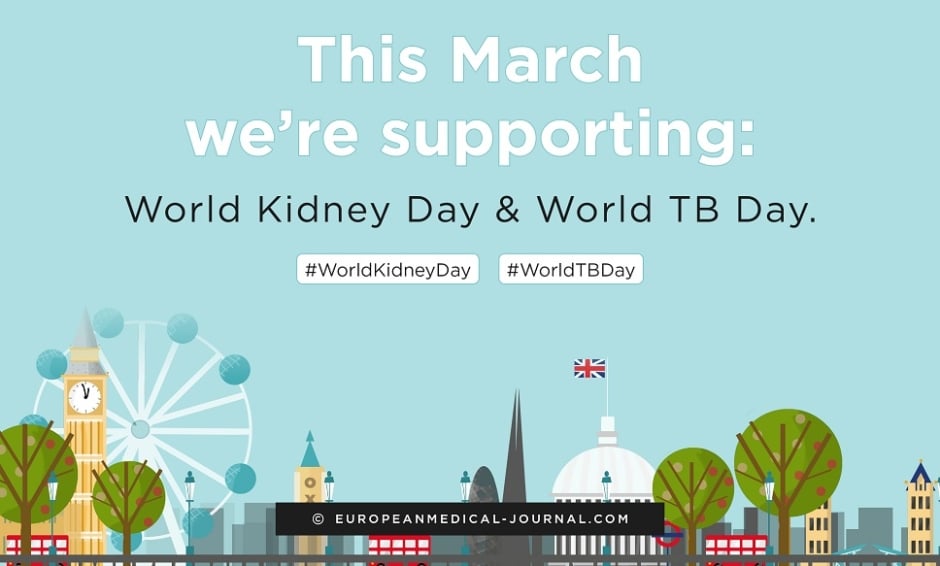Written by Saskia Weaver-Pronk | Editorial Assistant, European Medical Journal
![]()
This March, EMJ has proudly showcased its support for World Kidney Day and World Tuberculosis (TB) Day.
World Kidney Day is a global event aimed at educating and raising public awareness of the importance of kidney health. This year, the event is held on the same day as International Women’s Day: the 8th of March.
Fittingly, the overarching theme of the event concentrated on women’s kidney health. Key focusses included chronic kidney disease (CKD), which, in the UK, is more prevalent in women than in men, especially older women.1 Another core topic was the importance of a timely diagnosis in kidney disease, thus enabling women to access therapies to slow disease progression. Lastly, better planning and closer monitoring of kidney disease during pregnancy to promote improved health outcomes was also discussed.
Leading the UK initiative this year was the National Kidney Federation (NKF), Kidney Care UK, Kidney Research UK, and The Polycystic Kidney Disease (PKD) Charity UK, all of whom encourage the public to become aware of the importance of maintaining a healthy lifestyle to help protect the kidneys, in addition to the risks for developing kidney disease and the impact it has on patients.2
Another important event in March was World TB day. Celebrated globally every year on the 24th of March, World TB day commemorates the date in 1882 when Dr Robert Koch announced his discovery of Mycobacterium tuberculosis, the bacillus microbe that causes TB.3
World TB day primarily aims to raise public awareness about the TB epidemic and is one of eight official global public health campaigns marked by the World Health Organization (WHO). This year’s theme was ‘Unite to End TB’ which runs parallel to ‘A Sustainable Development Goal’ of the United Nations; a strategy that strives to end the TB epidemic by 2030.4
Back in 1882, whilst Koch was making his pivotal announcement in Berlin, Germany, TB was rampaging through Europe and the Americas, resulting in the death of one in every seven people. From this point, Koch’s discovery initiated the journey towards diagnosing and curing TB.
So, how far have we come since 1882? It is estimated that 53 million lives were saved between the years 2000 and 2016 through TB diagnosis and anti-TB medication. At present, however, despite TB being preventable and curable, it remains in the top 10 causes of mortality worldwide; causing the deaths of nearly 1.5 million people each year, mostly in developing countries (>95%).5 Furthermore, approximately one-quarter of the global population is latently infected with TB, and current efforts have proved insufficient in identifying and treating latent TB infection and TB disease.
World TB day aims to engage the public and create greater awareness regarding important issues that continue to wreak havoc in large parts of the world almost 140 years after TB’s discovery.
References
- UK Government. CKD prevalence estimates for local and regional populations. Available at: https://www.gov.uk/government/publications/ckd-prevalence-estimates-for-local-and-regional-populations. Last accessed: 15th February 2018.
- World Kidney Day. Available at: https://www.worldkidneyday.co.uk/. Last accessed: 15th February 2018.
- Centers for Disease Control and Prevention. World TB Day 2018. Available at: https://www.cdc.gov/tb/worldtbday/default.htm. Last accessed: 15th February 2018.
- United Nations. Sustainable Development. Available at: http://www.un.org/sustainabledevelopment/health/. Last accessed: 15th February 2018.
- World Health Organization. Tuberculosis. Available at: http://www.who.int/mediacentre/factsheets/fs104/en/. Last accessed: 15th February 2018.








